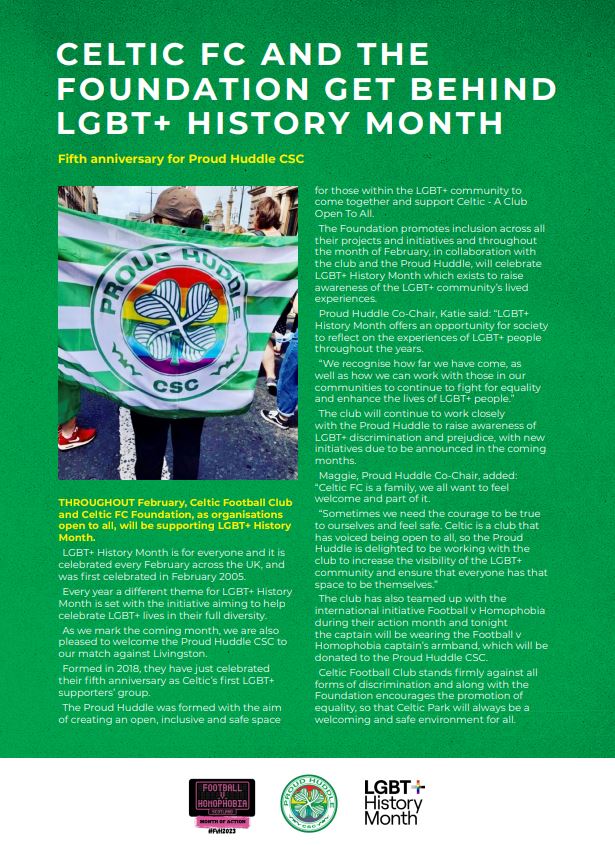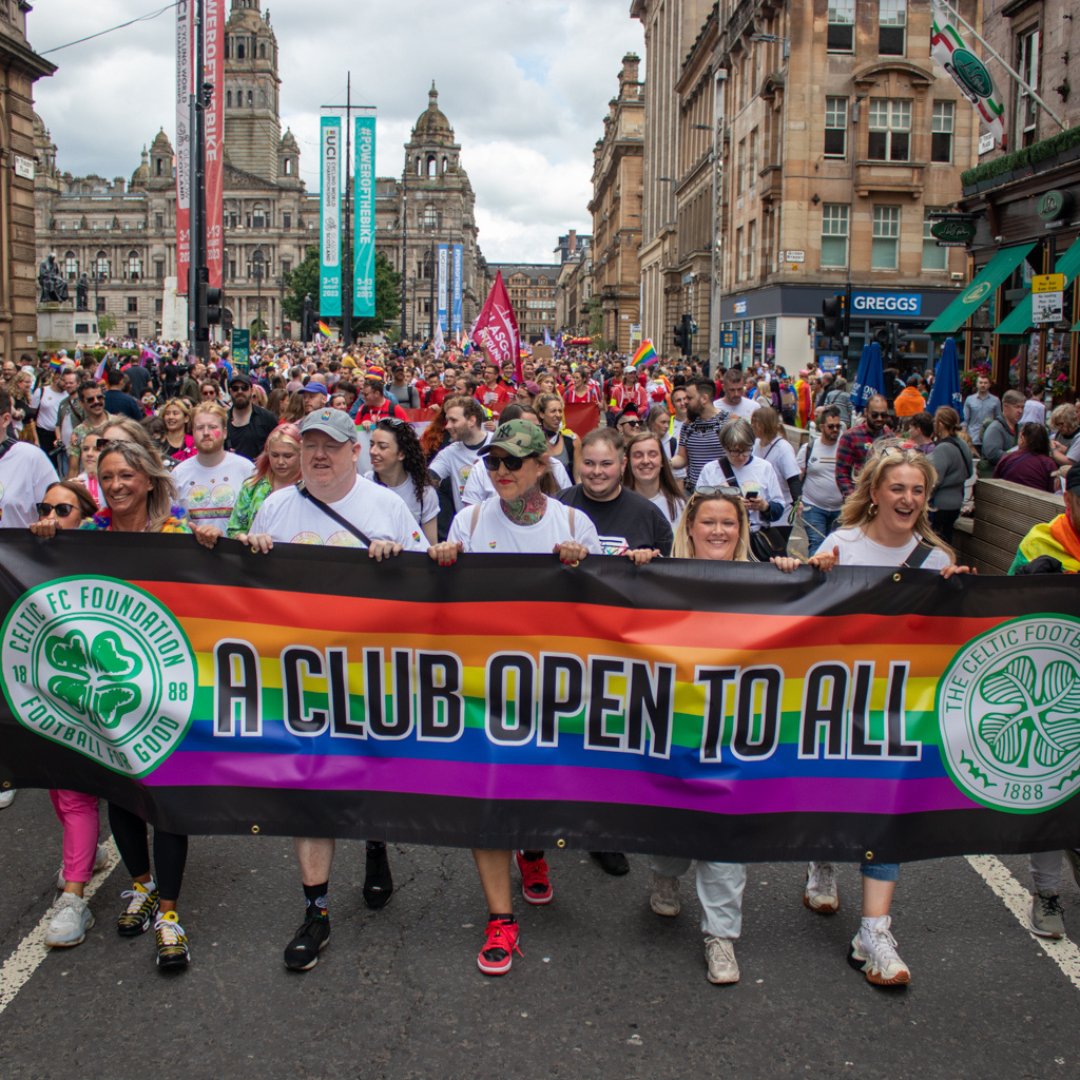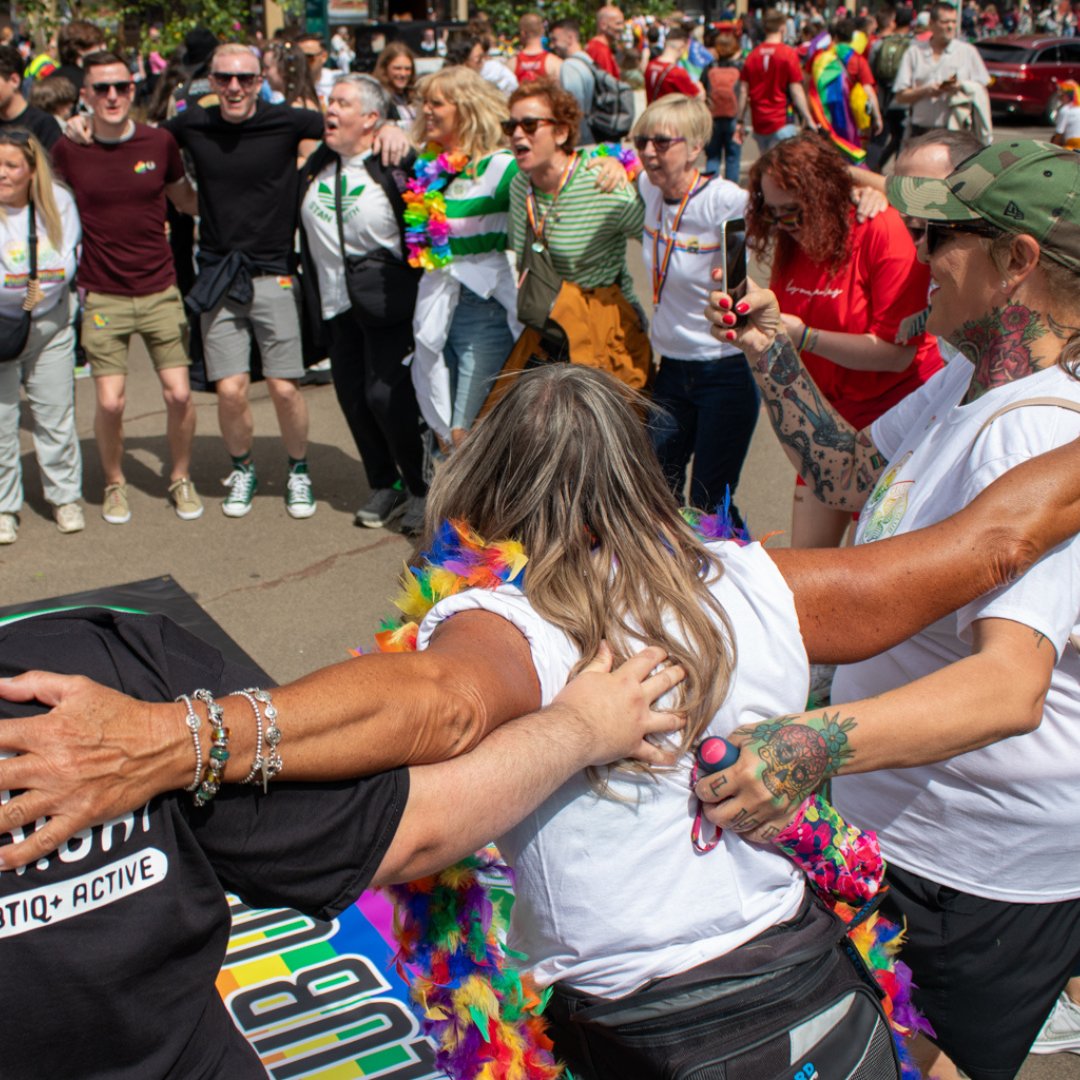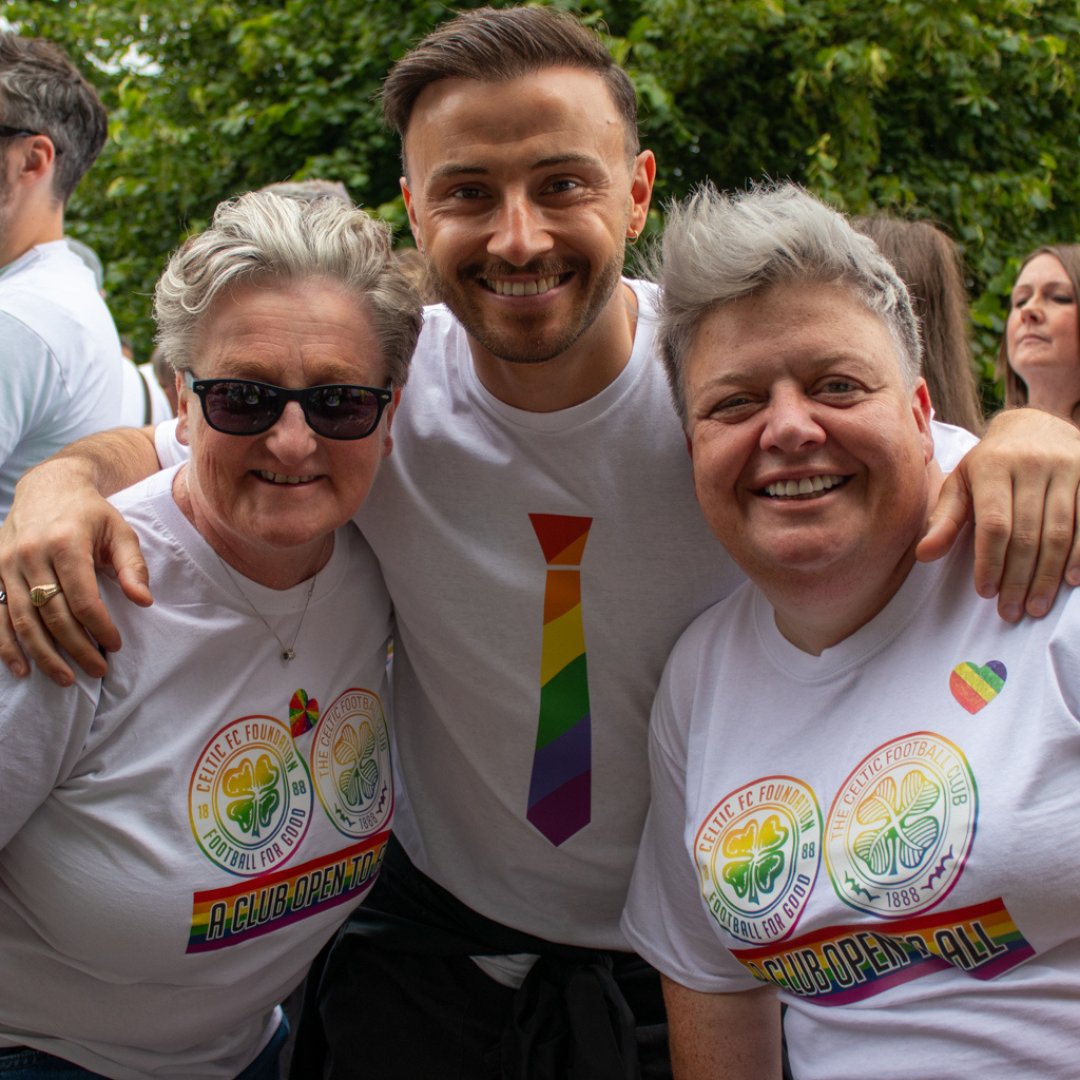Details
aka: Lesbian, Gay, Bisexual, and Transgender (LGBT), Homosexuality, LGBT, LGBTQ+
Ref: Homosexuality, supporters and Celtic staff & players
Details
| “Being gay or bisexual shouldn’t matter in football. As soon as you put that strip on, you’re one of us – no matter who you are.” Celtic Captain Scott Brown (2019) |
Football has always reflected society, but it has also helped to either ground it in views or helped it to evolve. In the modern age, times have progressed and prejudice against sexuality have become as unaccepted as that as prejudice against other groups.
Football, at all levels, was avowedly homophobic. On the training grounds, any weakness meant a player was labelled derogatorily using homophobic slurs, whilst the terraces were loud with offensive songs & chants against opposition players questioning their sexuality. Homophobic humour was even open in the mainstream media in sport. When openly gay English footballer Justin Fashanu moved to play for Airdrie & then Hearts back in the early 1990s, it unleashed a torrent of offensive taunts on the terraces from all supports across Scotland.
The progress of the LGBT+ community at Celtic
There is no trying to disguise the fact that the Celtic support in general as with the rest of the Scottish & Irish communities over the years, have previously been intolerant of homosexuality. Religious views can’t be held up as responsible alone for this, we all have to admit our errors.
Society has thankfully changed into the 2000s, and football has caught up alongside it. With football’s blue-collar roots and often testosterone fuelled culture, it has been quite a turnaround. On the other hand, football has been singled out too often when there was a bigger picture to look at.
There are now Celtic groups out there to support fellow fans in the LGBT community in various ways, such as the Proud Huddle CSC formed in January 2018. The supporters on the terraces have even had banners in support of fellow supporters in the LGBT community. It would have been mostly unthinkable over the first 100 years or so in the club’s history.
There have been a number of similar support groups across many other clubs in the UK, and we should all offer out a hand in support.
One of the more humorous but wonderful touches, was once a Celtic related group was formed by female Celtic fans called ‘The Lesbian Lions‘. It was a sign of normalisation & acceptance of homosexuality.
Gay Players at Celtic
To time of writing, there has yet to be a regular Celtic player who has played for the first team who has been openly gay, however that is the same throughout practically all of top tier football although there have always been wild rumours that have flown about on certain players. No one should be forced to come out, it is their own prerogative and everyone should respect that, and any rumour-mongering should be halted.
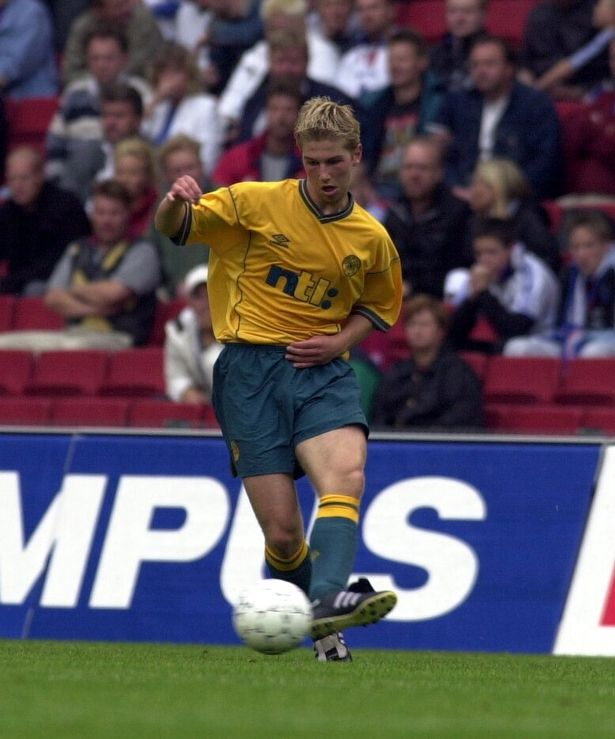 The only player ever (to this writer’s knowledge) who has both played for the Celtic first team and come out as being gay was Thomas Hitzlsperger who played in a few summer warm-up matches during a trial period under Martin O’Neill. He only did though come out openly as gay once he had retired from the game (coming out in 2014). To that point, he was the highest profile international footballer to have done so. However, during his time at Celtic he was in a long-term relationship with a lady, and he admits that he only realised he was gay when he was older in what would be somewhere around the 2010 period, so long after his time at Celtic. Any other remaining details are his own personal business.
The only player ever (to this writer’s knowledge) who has both played for the Celtic first team and come out as being gay was Thomas Hitzlsperger who played in a few summer warm-up matches during a trial period under Martin O’Neill. He only did though come out openly as gay once he had retired from the game (coming out in 2014). To that point, he was the highest profile international footballer to have done so. However, during his time at Celtic he was in a long-term relationship with a lady, and he admits that he only realised he was gay when he was older in what would be somewhere around the 2010 period, so long after his time at Celtic. Any other remaining details are his own personal business.
In 2022, Gala Fairydean Rovers striker Zander Murray announced he was gay – making him the first Scottish senior player to do so (albeit not a player with a top tier side).
Tolerance is important, and when the day comes that a gay Celtic player does opt to be open about their homosexuality then we should all show our respect & support to him.
Moving Forward…
For anyone interested in related issues, please contact the respective Celtic groups in the below links.
Celtic is a club open to all, and that should always be remembered.

Links
- Email: proudhuddlecsc@outlook.com
- Facebook:https://www.facebook.com/Proud-huddle-csc-141911443061915/
- Twitter: Proud Huddle CSC @CelticCSCPride


“Being gay or bisexual shouldn’t matter in football. As soon as you put that strip on, you’re one of us – no matter who you are.
“I’d like people to know that I’m there. I’d never judge someone for their sexuality, or have a problem with it”
Celtic Captain Scott Brown 2019
Quotes & Anecdotes
1) Bertie Auld was once on ‘Off the Ball with Tam Cowan‘ (a popular Radio Scotland offbeat football show) and he said to Cowan “Did you know one of the Lisbon Lions was gay?“. Cowan got all excited and thought he was onto a story. Bertie Auld next followed up with: “Give us a kiss and I’ll tell you who it was!“.
2) “…the blue half of my city say GCC actually stands for the Glasgow Celtic Council for Gays Catholics Communists”
Misty Thackeray (UKIP candidate for elections) (2014)
3) “Being gay or bisexual shouldn’t matter in football. As soon as you put that strip on, you’re one of us – no matter who you are.
“I’d like people to know that I’m there. I’d never judge someone for their sexuality, or have a problem with it”
Celtic Captain Scott Brown 2019
Articles
LGBT Prejudice in Football
LGBT Prejudice in Football
27th January 2018
LGBT Prejudice in Football
https://leapsports.org/blog/lgbt-prejudice-in-football
Let’s get straight to the point here; LGBT prejudice exists in football, as it does in life.
**This article contains strong language which some readers may find upsetting.
Let’s get straight to the point here; LGBT prejudice exists in football, as it does in life. If it didn’t, we would know of multiple LGBT footballers at the top level, we would wear their name on the back of our jersey, we would applaud them as they walked onto the pitch and their sexuality wouldn’t act as a stick with which to beat them with every time they took to the field, as experienced by so many LGBT footballers at lower levels of the game. Not only does this prejudice affect players, but it affects fans too.
As a bisexual woman I have faced, what I would describe, as mild homophobic prejudice and with that said the homophobic bile that I heard from three rows behind in the seat that I held in the lower North Stand for six seasons at Celtic Park was not in fact directed at me but at one of our own players who had shied away from a challenge. This inaction justified him to be branded a “******* poof”. As a Scottish football fan I am well aware of the age old tradition of going “right ******* threw the man” and to do anything less makes you a “***** bag”. I, like many others, have often thought less of players who never stuck to this tradition, who got scared of challenging for the 50/50 ball but can you explain to me why “poof” was the alternative word used to describe the player as less than his opponent? And can you understand why the use of the word “poof” to describe someone as inferior, scared and weak supports and reinforces the idea that to be homosexual is lesser than everyone else?
This homophobic abuse wasn’t directed at me and yet the language used by my fellow Celtic supporter engulfed me in a way that I don’t think language before or since ever has. I did think about standing up from my seat and challenging a member of our Celtic family on the language he had callously used towards one of our own, but I didn’t. Sitting next to my Father, who I hadn’t yet came out to; I slumped back in my seat and continued to watch the game.
Hearing language of this nature on the stands is harmful. I wish I had turned round and gave that man his comeuppance that day, but I never did. Instead I retreated from the language I heard and continued to deny my identity to my friends and family because of the fear that had been placed upon me by a member of my community (the Celtic family) who always assured me I would never walk alone.
Before we move on from this, I would like to put my hands up and confess the guilt I have felt for not reporting the issue. I am the first to admit this is a very difficult thing to do for various reasons. My initial reason was I hadn’t came out to my Dad yet, and walking up to a steward to report an incident would likely end with me having to tell my Dad I’m bi, which I wasn’t ready to do yet. Other reasons include shame, not wanting to be labelled a grass and, the worst, expecting that even if I did report it nothing would be done. I can’t really expect to be angry or disappointed in people (homosexual, heterosexual or otherwise) who don’t report homophobia at football grounds, because I haven’t done it myself. But imagine the weight off my shoulders, and how safe the young 16 year old me would have felt if someone had intervened and told that guy to give it a rest.
Regardless, I have no doubt that I am welcome at Celtic Park. I wish to make that abundantly clear. This was one incident over a 16, going on 17, year relationship with Celtic. But you can’t tell me I’m the only one who has experienced prejudice like this at a football ground.
Since 2015 we have seen the launch of a few LGBT supporters clubs in Scotland. Aberdeen were the first to launch such a supporters group, namely the Proud Dons. Hearts were next and in 2016 they launched their LGBT supporters group Tynecastle Pride. In the summer of 2017 Dundee followed with the Proud Dees and at the end of last year Partick Thistle created their own LGBT supporters group the Proud Jags.
I have read many tweets, fan forums and Facebook posts which are wholeheartedly negative towards the existence of LGBT supporters groups, and don’t want them anywhere near their club. Some believe they are unnecessary, others deduce that they are divisive while others just outright don’t want gay fans or players anywhere near their football club.
Here is my reason why LGBT supporters groups and LGBT friendly football clubs are imperative to football, and British football culture:
LGBT supporters groups and LGBT friendly football clubs are essential because their ability to give a face, a voice, a body and a personality to LGBT people completely destroys the stereotypes, the presumptions and misinterpretations which ultimately lead to the broad misunderstanding that we are somehow less of a human than you. We are the invisible minority, therefore people will always assume they know what a stereotypical gay person looks like, how a stereotypical gay person acts, how a stereotypical gay person talks, how a stereotypical gay person walks and how a stereotypical gay person see’s you. Note: it is because of these stereotypes, and misinterpretations, that some people don’t want to associate or connect with LGBT people in any way.
Look at it this way; in the same way that the police deem you (and me), the Scottish football fan, to be a criminal long before we’ve even entered the ground so to do you judge me (and the entire LGBT community) to be something we’re not, simply based on inaccurate and stereotypical interpretations.
Before people get to know us, we are judged. To explain, from as early as I can remember I was labelled a tom boy. This label had a profound effect on me because it made me different from the other girls in my class. I stood out and not necessarily in a good way. Being a tom boy is synonymous with being masculine and having male characteristics. I have never really been able to shake this label, and I suppose it doesn’t bother me as much as it did then because I’m so used to it by now but let’s explore the significance of why I was labelled as someone who ultimately lacks feminine qualities. Because it is significant.
I was labelled a tom boy because I loved sports (sigh). Anything to do with running, jumping, catching, throwing, kicking, sweating, competing and exercising – I was your girl. My passion for sports justified adults, children, family and friends to question my femininity. Can you imagine how difficult that is for a child (as I was at the time) to comprehend? These are huge issues to be dealing with at primary school but I dealt with it every single day, probably until the day I left high school.
Without going into the demons of my childhood the important point to make here is that from an early age, and simply because I loved sports (a typically male past time), I was stereotyped as something I didn’t necessarily identify as. The stereotype I was labelled with had an enormous effect on my dress sense, the friends I kept, the way people spoke to me, the activities I took part in and so much more. It impacted most of the decisions I made in my young life. This is the exact reason why LGBT supporters groups and LGBT football clubs are completely justified and overwhelmingly necessary.
LGBT supporters groups and LGBT friendly football clubs stop the LGBT community from being the invisible minority at football grounds. There is no doubt that outdated, over exaggerated, inaccurate and stereotypical descriptors of ‘what it means to be gay’ or ‘what it means to be a man/woman’ is the root cause of LGBT prejudice at football grounds among football supporters. It is visibility, and the opportunity that it gives us to integrate, that will bring an end to foolish stereotypes and, most importantly, will allow us to connect on a level that isn’t based on perceived sexuality/gender.
Now I am not writing this in an attempt to attack football or my football club. I was just as proud as anyone, if not more so as a member of the LGBT community, the day Celtic unveiled a rainbow flag banner at Rugby Park. I was immensely proud sitting among friends, drinking a vodka in Blackfriar’s pub at Merchant City after marching in my first ever Pride March in Glasgow.
On that day, I showed my colours for the first time, and so did my football club and it will forever fill me with joy. But why not have a lasting connection to the LGBT cause? We are, after-all, A CLUB OPEN TO ALL; let’s cement our vision. Having an LGBT Celtic supporters group is not divisive; it’s celebratory of the diverse football culture that we have sustained since 1887 when Brother Walfrid formed a football club to “encourage social integration”.
If Celtic, and more importantly my fellow supporters, had told me 10 years ago “Lindsay, you can be LGBT and out and proud” then I would have saved many years of painstaking misery.
We are Celtic Football Club; a club open to all. Let’s cement our vision; in a way that only the best fans in the World know how.
Proud Huddle C.S.C is the first ever Celtic LGBT Supporters Club. We are a club open to all.
If you would like to join us, please get in touch via e-mail at proudhuddlecsc@outlook.com. Alternatively, you can find us on Facebook at ProudHuddleC.S.C or on Twitter.
Written by Lindsay Hamilton on 27th January 2018. Lindsay Hamilton is 23 years old and is from Glasgow in Scotland. She supports Celtic Football Club and plays as a midfielder for United Glasgow FC. Lindsay currently writes two sports blogs, namely Sports History & Culture and The Fitbaw Weekly.
Lindsay is one of six founding members of Proud Huddle C.S.C.
Celtic support Rainbow Laces campaign
CELTIC Football Club is delighted to be showing our support for lesbian, gay, bi and trans players and fans by wearing Rainbow Laces at our Premiership match against Motherwell at Fir Park on Wednesday, December 5.
Rainbow Laces is Stonewall Scotland’s campaign to change attitudes in sport and make sure that LGBT people are welcomed and accepted at all levels of the game.
Sadly, many lesbian, gay, bisexual and trans (LGBT) people have a poor experience in sport and have experienced discrimination because of who they are.
Research shows that almost half of LGBT people think that public sporting events, such as football matches, aren’t a welcoming space for them.
Colin Macfarlane, Director of Stonewall Scotland, said: “We are delighted that SPFL clubs are supporting our Rainbow Laces campaign, and by doing so, standing with LGBT football fans across Scotland.
“We want to see fans make similar commitments and become active allies to LGBT people by creating a welcoming environment and challenging abuse. Many LGBT people want to take part in football, either as players or fans, but abuse from a small minority makes many people feel unsafe.
“We look forward to working alongside the SPFL and clubs across Scotland to help make football everyone’s game.”
Celtic captain, Scott Brown said: “This year’s campaign once again addresses a very important issue which needs to be tackled. Therefore, we are delighted to once again support the Rainbow Laces campaign and promote the very important message that sport is for all.”
We can only stop homophobic, biphobic and transphobic behaviour and language from happening in football by showing that it is not acceptable, at every level of the game.
We are dedicated to eradicating any forms of homophobic, biphobic or transphobic behaviour and making sure Celtic Football Club is a place where LGBT fans can be safe and accepted.
We need you to stand with us as allies to LGBT people.
Find out more at www.stonewall.org.uk/rainbowlaces
From the Daily Record
Tam Cowan, 9 Jun 2007
THE LESBIAN LIONS IF you think Celtic launching their own ladies’ football team is just an excuse for cheap jokes about The Lesbian Lions you’d be wrong. Nope, I only mention it because there’s one important question I would like to ask. How long do you think it will be before the players start moaning about the hoops on their new jerseys making them look fat?
(Clear sign that some idiots have not progressed)
NEW LGBT SUPPORTERS GROUP LAUNCHES AT CELTIC FC
A new LGBT supporters group is being launched for Celtic fans this month. ‘Proud Huddle CSC’ will open its doors at a special event on 23rd January in Glasgow.
The group is the idea of lifelong Celtic fan, Iain Sharkey, who told us how the group has gathered pace over the past few weeks:
“The idea came about when we saw other clubs throughout the UK setting up LGBT groups for fans. I created a Facebook group and from that started making contact with other fellow Celtic fans who liked the idea and wanted to help out.”
Proud Huddle now join a growing list of LGBT supporters groups in Scotland, including Aberdeen’s Proud Dons, the Proud Dees at Dundee FC, Tynecastle Pride at Hearts FC and the new Proud Jags group with Patrick Thistle.
LEAP Sports have supported Iain and the Proud Huddle group get up and running, and their spokesperson told us: “Growing LGBTI football fans groups is a key part of our Football v Homophobia work and it has been a real pleasure to support Proud Huddle CSC in their development.
The group so far have been fantastic, their passion for Celtic and LGBTI+ inclusion there is unparalleled and we look forward to seeing the impact such a group can make.
We see the emergence of Proud Huddle CSC as a positive step towards LGBTI+ visibility in Scottish football and encourage anyone interested in setting up an LGBTI+ fans group elsewhere to get in touch.”
Last year Celtic fans displayed a huge banner at their game with Kilmarnock which said “A Club Open to All”.
The message was supported by fans online, and one post in particular has had thousands of Likes.
The club also signed up to the LGBT Sports Charter back in August 2017 and in November took part in the Stonewall Rainbow Laces campaign, with Celtic skipper Scott Brown reinforcing the message that “sport is for all”.
Iain explained why he thinks there’s an important place for LGBT supporters groups to improve social connections and break down barriers in sport, “Some people want to use [the group] to challenge homophobia but also some want to just get together to watch games and have a beer.”
Supporters are encouraged to go along and join the Proud Huddle launch, with details available on their.
You can follow Proud Huddle on Facebook or Twitter or get in touch via email at proudhuddlecsc@outlook.com
Main pic credit: @garland_conor on Twitter
